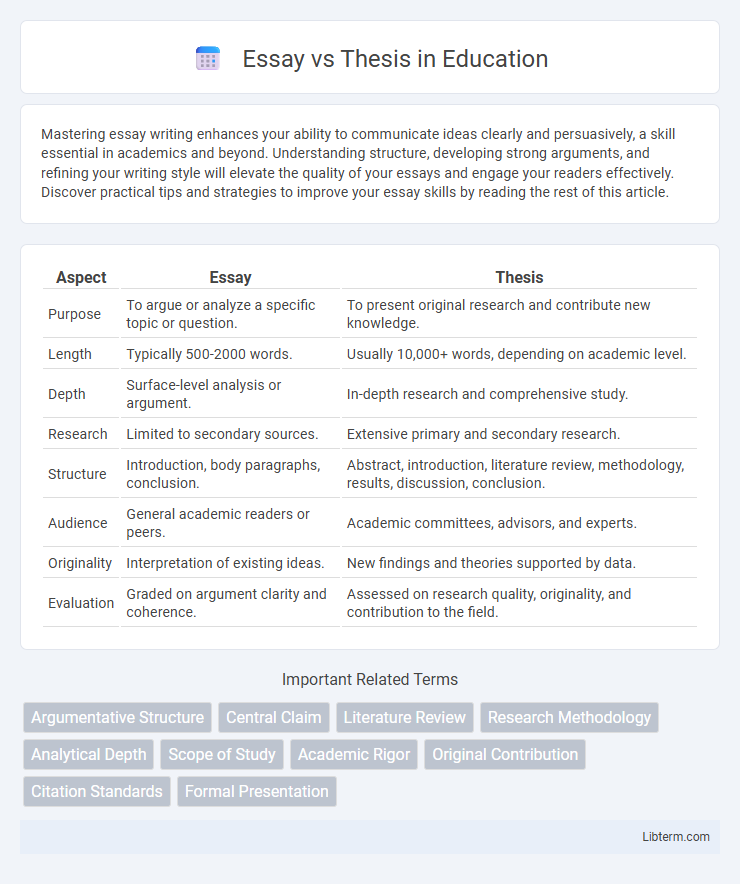Mastering essay writing enhances your ability to communicate ideas clearly and persuasively, a skill essential in academics and beyond. Understanding structure, developing strong arguments, and refining your writing style will elevate the quality of your essays and engage your readers effectively. Discover practical tips and strategies to improve your essay skills by reading the rest of this article.
Table of Comparison
| Aspect | Essay | Thesis |
|---|---|---|
| Purpose | To argue or analyze a specific topic or question. | To present original research and contribute new knowledge. |
| Length | Typically 500-2000 words. | Usually 10,000+ words, depending on academic level. |
| Depth | Surface-level analysis or argument. | In-depth research and comprehensive study. |
| Research | Limited to secondary sources. | Extensive primary and secondary research. |
| Structure | Introduction, body paragraphs, conclusion. | Abstract, introduction, literature review, methodology, results, discussion, conclusion. |
| Audience | General academic readers or peers. | Academic committees, advisors, and experts. |
| Originality | Interpretation of existing ideas. | New findings and theories supported by data. |
| Evaluation | Graded on argument clarity and coherence. | Assessed on research quality, originality, and contribution to the field. |
Introduction to Essay vs Thesis
An essay introduction presents a concise overview of the topic, establishing the main argument or purpose in a few sentences, while a thesis introduction provides a comprehensive background, scope, research questions, and objectives to justify the study's significance. Essays typically prioritize clarity and engagement to capture the reader's interest quickly, whereas thesis introductions emphasize detailed context and literature review to frame the research problem. The structure of a thesis introduction is more extensive, often including hypotheses and methodology outlines, reflecting the academic rigor required for advanced research.
Defining an Essay
An essay is a short, focused piece of writing that presents an argument or analysis on a specific topic, typically ranging from 500 to 2,000 words. It emphasizes clarity and coherence, structured with an introduction, body paragraphs, and a conclusion to support the thesis statement. Unlike a thesis, essays are less comprehensive, designed for concise exploration rather than extensive original research.
Understanding a Thesis
A thesis is a comprehensive research document presenting original arguments and deep analysis on a specific topic, often required for academic degrees like master's or doctoral programs. Unlike an essay, which addresses a question with a concise argument and personal reflection, a thesis demands rigorous methodology, extensive literature review, and clear contribution to the scholarly field. Understanding a thesis involves recognizing its role in advancing knowledge through systematic research and formal academic standards.
Purpose and Objectives
An essay primarily aims to present a concise argument or analysis on a specific topic, focusing on expressing the writer's perspective with supporting evidence. A thesis serves as a comprehensive research project that seeks to contribute original knowledge or insights to a particular academic field through systematic investigation and detailed examination. The objective of an essay is to persuade or inform within a limited scope, whereas a thesis aims to demonstrate mastery and critical understanding by addressing complex research questions in depth.
Structural Differences
An essay typically consists of an introduction, body paragraphs, and a conclusion, emphasizing concise arguments and analysis within a limited word count. A thesis requires a more complex structure, including a literature review, methodology, results, discussion, and conclusion, reflecting extensive original research. The thesis framework supports in-depth investigation and comprehensive data interpretation, whereas essays prioritize brevity and focused argumentation.
Research Depth and Scope
An essay typically involves a concise examination of a specific topic, offering a limited research depth with a focus on summarizing existing knowledge and presenting personal analysis. In contrast, a thesis demands extensive research depth and must contribute original insights, requiring comprehensive data collection and analysis over a broader scope within the academic discipline. The scope of a thesis encompasses multiple dimensions of a research problem, often including literature review, methodology, results, and discussion, whereas an essay centers on addressing a narrower question with a more straightforward argument.
Writing Style and Tone
Essays typically adopt a more informal and conversational writing style, allowing for personal opinions and subjective reflections, whereas theses require a formal, academic tone with objective analysis and evidence-based arguments. The tone of an essay often aims to engage and persuade a general audience, while a thesis maintains a scholarly tone designed for experts and researchers in the field. Precision, clarity, and consistency in terminology are crucial in thesis writing to establish credibility and rigor.
Academic Requirements
An essay typically requires a concise argument supported by evidence and critical analysis, usually ranging from 1,000 to 5,000 words, aimed at demonstrating understanding of a specific topic within a course. A thesis demands original research and comprehensive exploration of a subject, often exceeding 10,000 words, fulfilling the requirements for graduation at the undergraduate, master's, or doctoral level. Academic institutions mandate rigorous methodology, extensive literature review, and formal defense for theses, distinguishing them from essays in complexity and scope.
Common Mistakes to Avoid
Common mistakes when comparing an essay vs thesis include confusing their purpose, with essays typically presenting brief arguments and theses involving extensive research and original contributions. Students often overlook the importance of a thesis statement in essays or fail to maintain focused arguments, resulting in weak coherence. In thesis writing, neglecting proper citation and insufficient literature review can undermine academic integrity and depth.
Choosing Between Essay and Thesis
Choosing between an essay and a thesis depends on the scope and depth of research required; essays typically provide concise analysis or arguments on a specific topic, while theses demand extensive original research and contribute new knowledge to a field. Academic levels influence the choice, with essays commonly assigned in undergraduate courses and theses required for graduate or doctoral programs. Consider time constraints, research skills, and the intended academic or professional outcome when deciding between an essay and a thesis.
Essay Infographic

 libterm.com
libterm.com